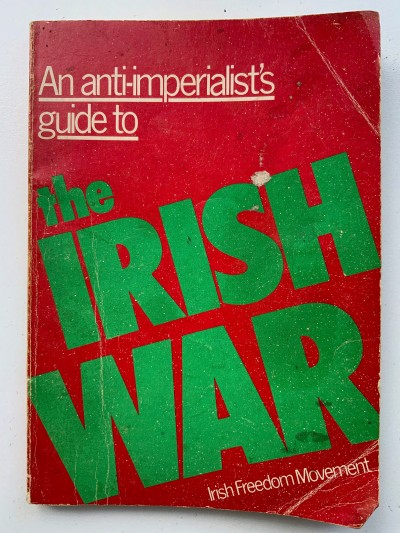An Anti-Imperialist's Guide to the Irish War

| Date: | 1983 |
|---|---|
| Organisation: | Irish Freedom Movement |
| Collection: | The British Left on Ireland |
| Type: | Book |
| View: | View Document |
| Discuss: | Comments on this document |
| Subjects: |
Please note: The Irish Left Archive is provided as a non-commercial historical resource, open to all, and has reproduced this document as an accessible digital reference. Copyright remains with its original authors. If used on other sites, we would appreciate a link back and reference to The Irish Left Archive, in addition to the original creators. For re-publication, commercial, or other uses, please contact the original owners. If documents provided to The Irish Left Archive have been created for or added to other online archives, please inform us so sources can be credited.
Commentary From The Cedar Lounge Revolution
12th June 2023
This short book published for the Irish Freedom Movement, a campaign established by the Revolutionary Communist Party is of significant interest. Across more than 130 pages it includes a range of materials about Ireland, ‘Why Britain stays’, ‘The Longest War’, ‘Judicial Terror’ and ‘War on the Home Front’. These articulate views of a piece with other materials published by the RCP during this period.
Of particular interest is a section entitled ‘War Facts’. This has short biographies and in some instances photographs, of a range of ‘personalities’ involved in the conflict including those associated with Sinn Féin, the IRSP and the Workers’ Party and of course loyalists and Unionists and Nationalist politicians.
There is a time line and an overview of ‘Irish Prisoners in British Jails’. There’s also an outline of ‘Britains’ machine of terror’ and a piece on the ‘Death Collin the Irish War’ as well as ‘Information on Ireland’. Although clearly framed by the RCP’s analysis it is of considerable use as a means of determining their analysis.
The Introduction gives a flavour of that analysis arguing that:
[this] book is for people in Britain who want to end the war in Ireland. For more than 13 years the war has raged in the cities , towns and villages of the Six Counties; its violent intensity has regularly spilled over the border into the Twenty-six Counties and across the sea to Britain. More than 2500 people have died, including more than 600 British soldiers and paramilitary policemen, more than 200 republicans and around 600 Catholic victims of sectarian attacks by Loyalists and British forces. Hundreds of non-combatants have been killed in more than a decade of bombings and shootings, rioting and repression.
One of the reasons why the war has dragged on for so long is the absence of a powerful movement in Britain to stop it. Many people are sympathetic to Ireland’s fight for freedom and suspicious of the official propaganda that justifies Britain’s continuing occupation. But ignorance and confusion about the Irish War hold back any movement against it. The British media has concealed the truth about events in the Six Counties and obscured the issues at stake in the conflict. British politicians – right, left and centre – have nurtured a consensus that backs up every act of repression in Ireland and marginalises opposition to the war at home.
And:
An anti-imperialist’s guide to the Irish War provides people who want to end the war with the information and the arguments they need to counter the papers and the politicians and to win wide support for the cause of Irish freedom. It provides the answers to the questions that come up every time the Irish War is discussed. Why does Britain stay in Ireland? Why don’t they just pull the troops out? What about the Protestants? Why can’t a political solution work? We examine the Six County state and British strategy during the war to deal with these questions and many more.
Chapter 6 which is entitled ‘Britain – tasks for anti-imperialists’ argues;
For 14 years the British establishment has succeeded in manipulating anti-Irish sentiment with the object of forcing all sections of society to close ranks behind government policy in Ireland. This success is especially apparent at moments when the liberation struggle causes a particular embarrassment or danger to Britain – for example, during the H-Block hunger-strikes or every time the IRA launches a bombing campaign in London. And Britain’s propaganda success is striking in that it has taken in not only middle class Tories and Liberals, but the great bulk of the labour movement.
Comments
You can also join the discussion on The Cedar Lounge Revolution
No Comments yet.
Add a Comment
Comments can be formatted in Markdown format . Use the toolbar to apply the correct syntax to your comment. The basic formats are:
**Bold text**
Bold text
_Italic text_
Italic text
[A link](http://www.example.com)
A link